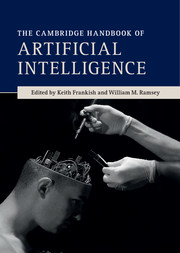1 - History, motivations, and core themes
Published online by Cambridge University Press: 05 July 2014
Summary
Introduction
This chapter introduces the field of artificial intelligence (AI) through a review of its core themes, history, major research areas, and current trends. The goal is to provide the reader with sufficient background context for understanding and appreciating the subsequent chapters in the volume.
Overview of core themes
The history of artificial intelligence may be best understood in the context of its core themes and controversies. Below is a brief listing of such AI distinctions, issues, themes, and controversies. It would be well to keep these in mind during your reading of the rest of this chapter. Each of the themes will be expanded upon and clarified as the chapter progresses. Many of these result from there being, to this day, no agreed upon definition of intelligence within the AI community of researchers.
Smart software vs. cognitive modeling. AI has always been a part of computer science, an engineering discipline aimed at creating smart computer programs – that is, intelligent software products to meet human needs. We shall see a number of examples of such smart software. AI also has its science side, which is aimed at helping us understand human intelligence. This endeavor includes building software systems that “think” in human-like ways, as well as producing computational models of aspects of human cognition. These computational models provide hypotheses for cognitive scientists.
Keywords
- Type
- Chapter
- Information
- The Cambridge Handbook of Artificial Intelligence , pp. 15 - 33Publisher: Cambridge University PressPrint publication year: 2014
References
- 18
- Cited by

